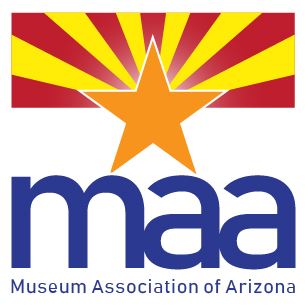Museum Association |
Museum Association of Arizona Advocacy Policy
Purpose
Emerging public policy debates or proposed regulations, legislation, or initiatives may affect the Museum Association of Arizona's (MAA) mission of building a vital museum community in Arizona. MAA’s Advocacy Policy provides guidance for Board of Directors regarding advocacy requirements and activities.
Scope
A. This policy addresses overall advocacy efforts by MAA and is in accordance with the National Council of Nonprofits guidelines (https://www.councilofnonprofits.org/everyday-advocacy).
B. MAA will not spend substantial resources in lobbying, i.e., attempting to influence specific legislation.
Conditions and Procedures
MAA may consider taking an advocacy role by using the following conditions and procedures:
A. Only the Board of Directors (Board) can decide on an official policy stand by the organization.
B. Suggestions for taking a policy stand can come from the Board, from Staff, from membership, or from external stakeholders. These suggestions should be sent to the Executive Director.
C. The Board may ask the Advocacy Committee or an ad hoc group to review the issues and provide additional information prior to a vote, if necessary.
D. The Board will use the following criteria:
1. The issue is germane to the MAA's mission.
2. The issue directly or indirectly affects Arizona’s museums, MAA, or the broader museum community.
3. The issue and the public policy changes addressed are within MAA’s area of expertise and knowledge as an organization.
4. The action will not jeopardize MAA’s organizational standing and mission.
E. Ongoing advocacy activities shall include forwarding emails via Listserv, social media posts, regular updates on the advocacy page of MAA’s website, and an advocacy section the MAA’s newsletter. Calls to action may also be sent to the membership on specific issues.
F. The following outlines other types of advocacy activities, requirements, and examples for actions MAA may carry out:
1. Adding MAA to a list supporting or opposing an issue:
a) Requirements: The Executive Director will seek authorization from the majority of the Board.
b) Example: Multi-organizational letters of support for appropriations funding or policy framework submitted to members of Congress and/or federal agencies, such as sustained funding for IMLS.
2. Sending a letter or communication advocating a position on an issue to relevant decision makers, solely authored and on behalf of MAA.
a) Requirements: The Executive Director will seek authorization from the majority of Board. The Board must approve the wording of any specific public advocacy statement to be issued.
b) Example: A letter to a French action house opposing the sale of Hopi katsina in 2013.
3. Direct engagement of the museum community by the MAA Board, Executive Director and/or designated volunteers in activities initiated by other organizations.
a) Requirements: The Executive Director will seek authorization from the majority of the Board. Any talking points that may originate from MAA should align with the initiating organization’s objectives.
b) Examples: MAA participates in the American Alliance of Museum’s Museum Advocacy Day annually as well as Arizona’s Arts and Non-Profits Advocacy Days. MAA has testified before the Arizona’s legislative committee for sunset reviews.
4. Direct engagement of the museum community by the Board, Executive Director and /or designated volunteers in activities initiated and organized by MAA or as part of a collaborative effort. The Executive Director will seek authorization from the majority of the Board to proceed.
a) Requirement: The Advocacy Committee or other ad hoc group will present the Board with proposed activity and objectives. The Board must give its approval before activities proceed.
b) Examples: MAA organizes an Arizona Museum Advocacy Day. Board members meet with elected officials at their district offices or invite elected officials to an MAA activity.
G. Potential advocacy activity shall be discussed and voted on during Board meetings. However, issues sometimes require quick responses and cannot wait for the next meeting. In those cases, discussion about the issue and a vote on proposed MAA action can be undertaken and recorded via e-mail. The issue should be reviewed at the next Board meeting.
H. The Executive Director or Board President will assume the leading voice in the communication unless they designate another individual. Once adopted, MAA’s position can be clearly communicated using established resources and communication channels, at the discretion of the Executive Director.
1. Where our actions involve letters to officials, letters to editors, and open letters to the public on our stand, they will be signed by the Executive Director or Chair of the Board of Directors.
2. MAA policy stands will be posted on its website and/or other established online communication channels.
3. Board members may not initiate action or speak on behalf of MAA without prior Board approval
I. MAA’s advocacy action will, unless the Board decides otherwise, be carried out in a non- partisan manner.
Approved by MAA Board: June 19, 2023
